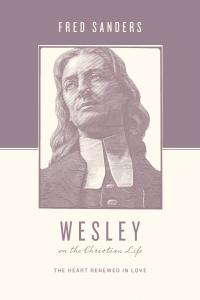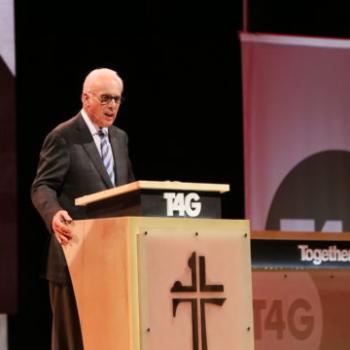Important Disclaimer: For the first 70 pages or so of this book, I was fairly sick. I know I read the material, because my marginal notations are found throughout. And I think, by skimming back over those notations, I’ve managed to pick up what I missed. But still, take this review with a grain of salt (and see the footnote below).
Fred Sanders’ Wesley on the Christian Life is another excellent work in a truly solid series. If this book does feel somewhat off from the others in the series (at least the others I’ve read, which is by no means all of them), I suspect the difference is Wesley rather than Sanders. After all, Wesley was a preacher—and a revival preacher at that—first and foremost, and only afterwards a theologian. Which doesn’t mean that he has nothing to say to us! If you take nothing else away from this book, you should take away the importance of Wesley for modern Christians.
And I don’t just mean “importance” in the sense of his influence on contemporary denominations like the Church of England, the Methodists (both of whom have largely bailed on his teachings anyway) and the Wesleyans (about whom I know almost nothing). Though he is of course important in that sense too.
What I mean by his “importance” is that the modern church has lost something that Wesley can teach us how to regain: namely a passionate fire for the Lord that flows within both Biblical orthodoxy and the institutional church. In fact, Wesley would (rightly) tell us that those three things–passion, orthodoxy, and the church) are tied together in Scripture in any case:
“A mystic has gone too far when he imagines he has passed beyond the need for the means of grace. Whether the mystic is a super-spiritual visionary who claims to need no fellowship with lesser Christians, a warmhearted evangelical who believes that his personal relationship with Jesus makes the Lord’s Supper irrelevant, or an antinomian who takes justification by faith to mean that it would be an insult to God’s grace to practice spiritual disciplines, Wesley’s definition of mysticism enables us to recognize that each of these has crossed into the mystic error. The problem is not with having, or even cultivating, a strong sense of God’s presence. The problem is with using that sense to eliminate the ordinances of God.” (176)

Just as he encourages us to hold fast to the methods established by God for our use, so Wesley would have us hold to the “whole” Gospel. Justification by faith alone, sanctification, and glorification must all be held by the believer. And while we can (and should) disagree with some of the specific of what he says about sanctification (particularly his perfectionism), Wesley would have none of the modern tendencies of accommodation in the name of reaching the unreached. After all, it does us no good to reach the lost if what we give them leaves them on their path to hell. Only the full message of the substitutionary life,death, and resurrection of the God-man and the subsequent new life of love for God and neighbor will suffice.
Which isn’t to say that I think Wesley is the best place for Christians to go to learn about the Christian life. Which again is a reflection on Wesley rather than Sanders. His perfectionism is a bigger problem than it appears in Wesley on the Christian Life, though Sanders makes a solid attempt to soften it a bit. And his Arminianism is of course not going to be a problem for everyone, but it should be 😛
Still, Wesley is clearly one of the great men that God has used in church history, and we would do well to read him. We would also do well to read Wesley on the Christian Life.
*Technically, the book is by Fred Sanders. And technically it was pneumonia. But “Fred Sanders gave me Pneumonia” both isn’t nearly as catch a title and wanders into “libel” territory, given that it’s probably not strictly true. John Wesley, on the other hand, is unlikely to sue me for anything.
Dr. Coyle Neal is co-host of the City of Man Podcast and an Associate Professor of Political Science at Southwest Baptist University in Bolivar, MO.













